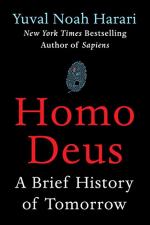|
This section contains 3,259 words (approx. 9 pages at 400 words per page) |

|
The importance of shared myths and the way they alter objective reality
Harari argues that the character of human societies is largely determined by the shared myths we create. The author draws a distinction between objective reality, that which exists concretely, and intersubjective reality, ideas and concepts that are created and shared by groups of humans, but which do not really exist objectively. To demonstrate this contrast, he uses the examples of the Egyptian Pharaohs and Elvis Presley. In both of these cases, there was an objective, physical being called Pharaoh or Elvis. These individuals had biological needs and functions, just like any species in the natural world. Simultaneously, however, Pharaoh and Elvis extended fay beyond their objective, biological role. Pharaoh was regarded a deity, whose cult inspired millions of Egyptians to work together to build massive infrastructure problems. Elvis remains an extremely popular cultural brand, supported by other...
|
This section contains 3,259 words (approx. 9 pages at 400 words per page) |

|




